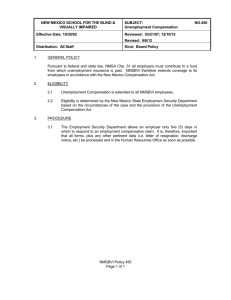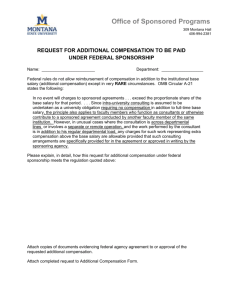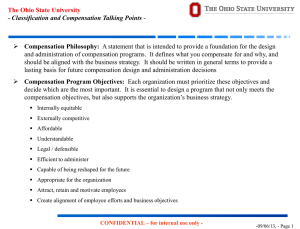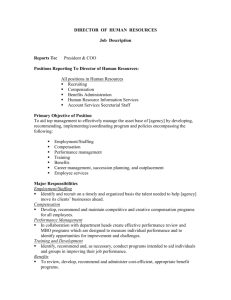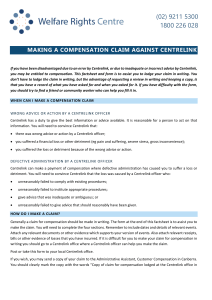WordPress.com
advertisement
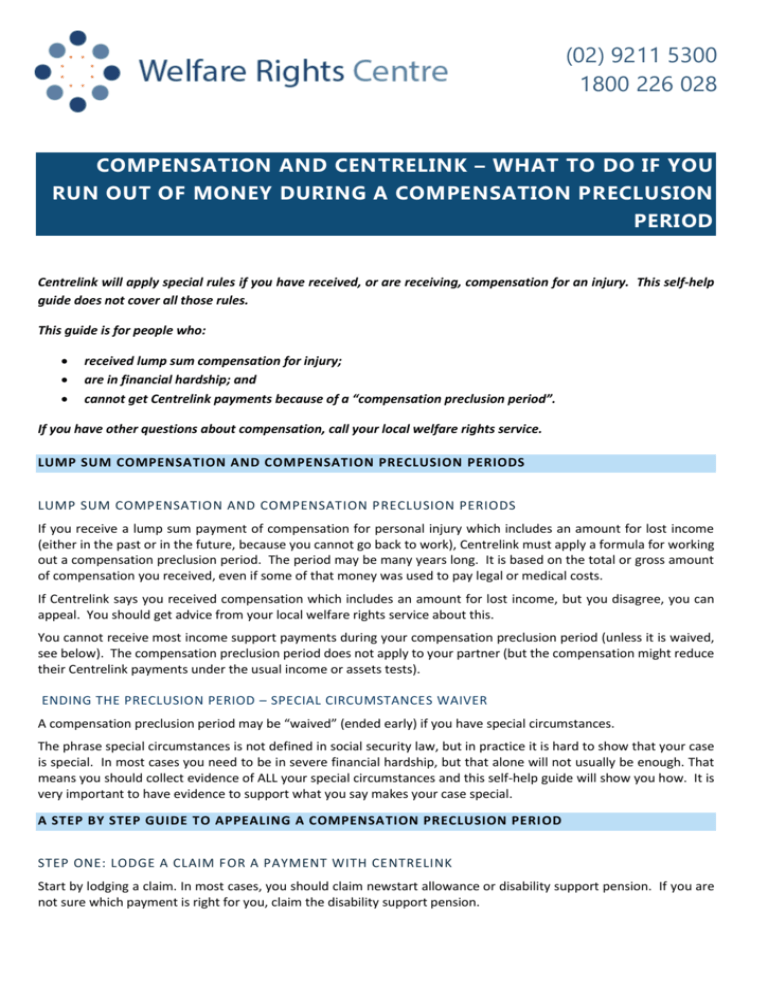
(02) 9211 5300 1800 226 028 COMPENSATION AND CENTRELINK – WHAT TO DO IF YOU RUN OUT OF MONEY DURING A COMPENSATION PRECLUSION PERIOD Centrelink will apply special rules if you have received, or are receiving, compensation for an injury. This self-help guide does not cover all those rules. This guide is for people who: received lump sum compensation for injury; are in financial hardship; and cannot get Centrelink payments because of a “compensation preclusion period”. If you have other questions about compensation, call your local welfare rights service. LUMP SUM COMPENSATION AND COMPENSATION PRECLUSION PERIODS LUMP SUM COMPENSATION AND COMPENSATION PRECLUSION PERIODS If you receive a lump sum payment of compensation for personal injury which includes an amount for lost income (either in the past or in the future, because you cannot go back to work), Centrelink must apply a formula for working out a compensation preclusion period. The period may be many years long. It is based on the total or gross amount of compensation you received, even if some of that money was used to pay legal or medical costs. If Centrelink says you received compensation which includes an amount for lost income, but you disagree, you can appeal. You should get advice from your local welfare rights service about this. You cannot receive most income support payments during your compensation preclusion period (unless it is waived, see below). The compensation preclusion period does not apply to your partner (but the compensation might reduce their Centrelink payments under the usual income or assets tests). ENDING THE PRECLUSION PERIOD – SPECIAL CIRCUMSTANCES WAIVER A compensation preclusion period may be “waived” (ended early) if you have special circumstances. The phrase special circumstances is not defined in social security law, but in practice it is hard to show that your case is special. In most cases you need to be in severe financial hardship, but that alone will not usually be enough. That means you should collect evidence of ALL your special circumstances and this self-help guide will show you how. It is very important to have evidence to support what you say makes your case special. A STEP BY STEP GUIDE TO APPEALING A COMPENSATION PRECLUSION PERIOD STEP ONE: LODGE A CLAIM FOR A PAYMENT WITH CENTRELINK Start by lodging a claim. In most cases, you should claim newstart allowance or disability support pension. If you are not sure which payment is right for you, claim the disability support pension. (02) 9211 5300 1800 226 028 COMPENSATION AND CENTRELINK – WHAT TO DO IF YOU RUN OUT OF MONEY DURING A COMPENSATION PRECLUSION PERIOD In almost all cases Centrelink will reject your claim. When it is rejected you should immediately tell Centrelink you want to appeal to an “Authorised Review Officer”. There is a form to help you do this at the back of this self-help guide, but you can also do it over the phone (ask for a receipt number for the phone call). Make sure you do this within 13 weeks of Centrelink rejecting your claim so you can get maximum backpay if your preclusion period is waived. There are a few payments that can be paid during a preclusion period, and you should check to see if you are eligible for any of these, for example: -family assistance payments if you have children in your care; -carer allowance, if you care for someone else daily; and -mobility allowance, for certain people who need substantial assistance to use public transport because of a disability. You might be eligible for a low income health care card 12 months after you receive the compensation. STEP TWO: COLLECT EVIDENCE FOR YOUR APPEAL It is very important to have evidence to support what you say makes your case special. Don’t be worried about the word “evidence”, most people with special circumstance have evidence, they just don’t realise it. This self help guide will help. There are two main topics you should collect evidence about in most cases: 1. Evidence about how much compensation money you got and the main things you spent it on; and 2. Evidence about your personal circumstances, including your current financial and living situation, physical and mental health and the health of any family members. EVIDENCE ABOUT HOW YOU SPENT THE COMPENSATION MONEY First, find the letter you got from your lawyer when your compensation case was resolved, which will usually show the total (gross) amount you were paid and also how much money you actually got in the hand (net). The lawyer’s letter should show what got taken out for your lawyer’s costs and medical and other expenses. If you lost it, your solicitor can give you a copy. Second, you need evidence about how the compensation money was spent. You should focus on the big expenses, not ordinary living expenses, and you should try to get enough information so you can show why you’re in hardship. A good place to start is your bank statements since you received the money. You should also look for receipts for major purchases (eg renovations, a car etc). If you repaid loans to family and friends, you should get them to write a letter about how much you paid them. If you had a business that failed, ask the accountant to write a letter explaining that the business failed and how much you lost. (02) 9211 5300 1800 226 028 COMPENSATION AND CENTRELINK – WHAT TO DO IF YOU RUN OUT OF MONEY DURING A COMPENSATION PRECLUSION PERIOD If you spent a substantial amount of the money on gambling or substance abuse, see below (under “evidence about addictions or anything else which affected your spending decisions”). EVIDENCE ABOUT YOUR PERSONAL CIRCUMSTANCES You should collect evidence about any personal circumstance you think makes your case special and justifies waiving the preclusion period. Centrelink has a policy which lists the main circumstances which are considered, which is available online at http://guides.dss.gov.au/guide-social-security-law/4/13/4/20. This is a very good starting point to help you work out what evidence to collect. Some of the most common circumstances are discussed below. EVIDENCE ABOUT YOUR CURRENT FINANCIAL AND LIVING SITUATION It is very important to have evidence about your current financial and living situation as, in most cases, a compensation preclusion period will not be waived unless you are in severe hardship. You should fill in the Welfare Rights Centre NSWs “statement of financial circumstances” form (on our website here). You should then attach any evidence you have about your financial situation, eg a credit card statement if you are living off your credit card. Provide copies of outstanding bills and any letters from debt collectors. You should also have evidence about your living situation. For example, if you are renting you could get a copy of your lease showing how much rent you are paying. You should include evidence if you are behind on the rent (for example, a printout of your rental ledger or a letter threatening eviction from your landlord). EVIDENCE ABOUT YOUR HEALTH It is usually important to have evidence about your health and the health of any family members. You do not need specialist reports. A letter from your GP is sufficient in many cases. Letters from psychologists and counsellors also help. An example of a doctor’s letter is included with this self-help package. It asks your doctor to write a letter answering some questions. It also asks not to charge you for writing the letter and this is something you should make sure you discuss with your doctor, psychologist or counsellor beforehand. EVIDENCE ABOUT ADDICTIONS OR ANYTHING ELSE WHICH AFFECTED YOUR SPENDING DECISIONS If you think your spending decisions were affected by something beyond your control, such as an addiction or a mental health problem, it is very very important to have evidence for this as it will help your case. Ideally, this evidence will come from a doctor or appropriately qualified counsellor, such as a gambling counsellor. But you should provide any evidence you have (for example, you may have spoken to a social worker about a gambling problem, in which case you should ask the social worker to write you a letter about this, or your bank statements may show that you spent a lot of money at pubs or clubs). An example of a letter to a counsellor about addictive behavior is included with this selfhelp guide. But you should contact your local welfare rights service for help with this also, as these can be difficult and complicated cases. (02) 9211 5300 1800 226 028 COMPENSATION AND CENTRELINK – WHAT TO DO IF YOU RUN OUT OF MONEY DURING A COMPENSATION PRECLUSION PERIOD EVIDENCE ABOUT ANY ASSETS YOU HAVE It is very difficult to have a compensation preclusion period waived if you have substantial assets which could be sold. It is a good idea to get advice from your local welfare rights service if you have substantial assets such as a car and especially if you own your home and used your compensation money to buy it or pay off the mortgage. If you do have an asset, but you have good reasons why you can’t sell it, you should provide evidence about this. For example, you may own a car but you need it to take your children to school or get to medical appointments because you live in an area without public transport, or it has been modified for your disability. You could get a letter from a teacher at the school or your doctor to confirm this. IF YOUR APPEAL TO AN AUTHORISED REVIEW OFFICER IS UNSUCCESSFUL If the Authorised Review Officer does not waive your preclusion period you can appeal to an independent tribunal called the Social Security Appeals Tribunal (SSAT). You can lodge the appeal by phone or online. See http://www.ssat.gov.au/. You should lodge your appeal within 13 weeks to ensure you get maximum backpay if successful. After the SSAT you have further appeal rights to the Administrative Appeals Tribunal. If you wish to do this you must appeal to the AAT within 28 days of receiving the decision of the SSAT to be sure that your appeal will be accepted. For more information on appealing see the factsheet “Appeals – how to appeal against a Centrelink decision”. You are also entitled to lodge a new claim for a payment in the future if your circumstances have changed and you want your new situation to be considered. For example, you may have been evicted from your rental property since you last claimed a payment. THIS FACTSHEET CONTAINS GENERAL INFORMATION ONLY. IT DOES NOT CONSTITUTE LEGAL ADVICE. IF YOU NEED LEGAL ADVICE PL EASE CONTACT YOUR LOCAL WELFARE RIGHTS C ENTRE. YOU CAN FIND YOUR LO CAL WELFARE RIGHTS CENTR E AT WWW.WELFARERIGHTS.OR G.AU. WELFARE RIGHTS CENTRES ARE COMMUNITY LEGAL CENTRES, WHICH SPECIALISE IN SOCIAL SECURITY LAW, ADMINI STRATION AND POLICY. THEY ARE INDEPENDENT OF CENTRELINK. ALL ASSISTANCE IS FREE. THIS FACTSHEET WAS UPDATED IN OCTOBER 2014 WWW.WELFARERIGHTSCEN TRE.ORG.AU (02) 9211 5300 1800 226 028 COMPENSATION AND CENTRELINK – WHAT TO DO IF YOU RUN OUT OF MONEY DURING A COMPENSATION PRECLUSION PERIOD [Date] Dear Doctor, Letter of support I am appealing against Centrelink’s decision that I cannot receive a Centrelink payment because of compensation I received in the past. To receive a Centrelink payment I need to show that my case is special. Could you please write a short letter of support for me that explains: How long I have been your patient; My physical and mental health problems, and any treatment I am taking; Whether you think my current situation is affecting me, including affecting my health problems or their treatment. Please address the letter “to whom it may concern” as I will likely be forwarding this letter to Centrelink and /or the Social Security Appeals Tribunal. As I cannot afford to pay for this letter, I am very grateful for your time and assistance in this matter. Yours faithfully, [signature and name] (02) 9211 5300 1800 226 028 COMPENSATION AND CENTRELINK – WHAT TO DO IF YOU RUN OUT OF MONEY DURING A COMPENSATION PRECLUSION PERIOD I want to appeal to an Authorised Review Officer Date: __________________ I am writing to request a review by an Authorised Review Officer. The decision I am appealing against and my reasons for appealing are set out below. Yours sincerely, My details My name: Date of birth: Centrelink customer number: Phone number: 1. I am appealing against the following decision: 2. The decision was made on the following date (if known): 3. I feel that the decision is wrong for the following reasons: (02) 9211 5300 1800 226 028 COMPENSATION AND CENTRELINK – WHAT TO DO IF YOU RUN OUT OF MONEY DURING A COMPENSATION PRECLUSION PERIOD 4. I think Centrelink has made an error (if applicable): 5. I think the Authorised Review Officer should take the special circumstances of my case into account. These special circumstances are: 6. I think the following evidence supports my request for a review:

